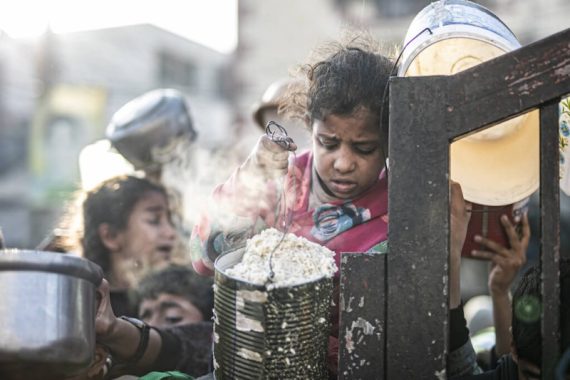I
srael launched an all-out attack on Gaza on October 7, citing a counterattack for Hamas’s Operation Al-Aqsa Flood. Gaza was first heavily bombed from the air, sea, and land for twenty days, and then a three-phase land operation was launched on October 27, supposedly to clear Gaza of Hamas.
Israel’s three-phase operation plan
In the first phase of the operation, the 40-kilometer-long Gaza Strip was cut in half, with the northern part divided into sectors to be screened and cleared of threats. Armored units were then introduced into these sectors and sweeping operations began. The Israeli army, which destroyed almost 70 percent of the buildings in the northern region where Gaza City is located, meanwhile asked the civilians living in the region to move to Khan Younis in the south for their own safety.
In the second phase, the town of Khan Younis, which had been declared a safe zone for civilians, was targeted and the superstructure there was severely damaged, while civilians sheltering in the area were told to move to Rafah in the south.
At the end of four months, the Israeli army had killed nearly 30,000 civilians, injured 70,000, and displaced about 1.5 million Palestinians, forcing them to migrate first to the south and then, if possible, to third countries. To make this possible, it has flouted international law and not refrained from committing war crimes, crimes against humanity, and genocide.
Israel’s current target is the town of Rafah, now the last frontier, and some 1.5 million Palestinians who have taken refuge there. It wants to enter Rafah and destroy and depopulate it, and in order to do so, it is trying to distract the world with a series of lies.
Israel’s arguments for the humanitarian attack
When Israel launched its attacks on Gaza on October 7, it claimed that its main objective was to rid Gaza of Hamas. However, from the first day, it became clear that its problem was not only Hamas: its aim was to destroy the whole of Gaza and depopulate the region by killing as many Gazans as possible.
In fact, according to reports by certain Jewish think tanks, all this is being done to return Gaza to its pre-2005 status.
In order to achieve this goal, Israel has indiscriminately bombed all settlements, hospitals, schools, and holy places of Muslims and Christians, as well as United Nations camps and aid facilities, and massacred tens of thousands of civilians. In doing so, it has resorted to lies such as claims that Hamas is hiding in tunnels dug under buildings, using civilians as human shields, or that those who appear to be civilians are in fact Hamas fighters.
As the Israeli army advanced from the north to the south of Gaza, it claimed that there were either hostages in the area or that Hamas leaders were hiding there, in an attempt to legitimize the attacks and massacres of civilians.
This cycle was repeated in Khan Younis after Gaza, and now the same claims are being made for Rafah, i.e., that there are Hamas tunnels under the area, that hostages are being held there, and that the head of Hamas in Gaza, Yahya Sinwar, and the commander of the al-Qassam Brigades, Mohammed Deif, are hiding there.
Furthermore, Israel attributes the fact that Hamas has been able to resist and still respond to Israel despite the heavy bombardment to the logistics provided by the tunnels that pass under Rafah and open into Egypt. Israel claims that both sides of Rafah must be secured and that Rafah is the cause of the tension it is experiencing with Egypt.
In a speech on February 18, 2024, former Israeli chief of staff and defense minister Gantz, who is also a member of the War Cabinet, stated that he gave Hamas until Ramadan to release the hostages and threatened that if all the hostages were not released by that date, a full-scale attack on Rafah would be launched.
As can be seen, Israel is trying to create excuses to attack Rafah and is conducting a perception operation to reduce the possible reactions it might face after the attack.
Read: Nakba 2023 in Gaza
Egypt’s position on Rafah
Although the Rafah border crossing, Gaza’s only link to the outside world, is open to Egypt, Egypt does not control it alone: when the gate is opened, how long it remains open, and who and what is allowed to pass through it are determined in coordination with Israel.
This joint control is based on the agreements Israel made with Egypt when it withdrew from Sinai in 1982 and from Gaza in 2005. In the agreements, Egypt guaranteed that it would provide the necessary controls at the Rafah gate for Israel’s security and that it would not open the gate without Israel’s consent, this has been the case with the exception of the Morsi period.
During these recent attacks, Egypt has opened the gate to humanitarian aid in a controlled manner and is, in fact, the country most opposed to Israel’s recent aggressive rhetoric against Rafah. Egypt estimates that 1.5 million Palestinians waiting in Rafah will gather at the border in the event of a possible attack, and it perceives Palestinian infiltration into its territory as a threat to national security.
On the other hand, according to rumors, it was proposed to Egypt to take the Palestinians from Gaza and settle them in Sinai in return for the payment of Egypt’s debts to the IMF and new economic aid worth about $20-25 billion. The Egyptian government allegedly did not accept the offer and even tried to cancel the Camp David Peace Accord signed with Israel in 1979.
Recent reports in international media claim that Egypt has started to build concrete walls one kilometer from the Rafah border gate to temporarily shelter Palestinians crossing the border in case of an Israeli attack on Rafah. In this way, the Palestinians forced to migrate by Israel will be given temporary shelter before entering Egypt, and a de facto buffer zone will be created.
In has also been reported that during President Erdoğan’s visit to Egypt on February 14, bilateral relations and the situation in Gaza were discussed and an agreement was reached that the two countries would work together to protect the Palestinians who would be crowded at the border in the event of an Israeli attack on Rafah. Turkey’s support alleviated pressure on Egypt and allowed it to take a firmer stand against Israel.
Recommended
Latest situation in Rafah
The population of Rafah, which was around 300,000 before the war, increased to approximately 1.5 million with the arrival of those who had to flee from the north. Since the city was unable to accommodate this number of people and meet their needs, most of this population was directed by the Israeli forces to the al-Mawasi area on the coast.
However, as there are no shelters or food supplies in the Mavasi area, and as it is completely defenseless, it is inevitable that hundreds of thousands of people will die of hunger and disease before the Israeli attacks unless the necessary aid is delivered.
Although Rafah is currently Gaza’s only gateway to the world, Israeli restrictions mean that only a small proportion of the aid arriving at the Egyptian port of al-Arish is allowed into Gaza. Israel’s attacks on UN camps and aid warehouses in Gaza have also disrupted the flow of aid from the UN, particularly the UNRWA. The situation in Rafah is, thus, worsening by the day.
International reactions to the possible attack
A possible Israeli attack on Rafah is opposed by the countries of the region, the OIC, the UN, the EU, Russia, China, the African Union, and Latin American countries, as well as the U.S. administration, which has supported Israel from the beginning.
Although the U.S. administration is now opposing the Rafah attack and increasing its criticism of the Netanyahu government, it continues to veto the ceasefire resolutions in the UN Security Council and continues to support Israel with arms and ammunition. The U.S. stance has had an effect on the ground, has it not? Would the situation not be different now if the U.S. were not vetoing a ceasefire and sending support.
Meanwhile, the genocide case brought by South Africa against Israel in the International Court of Justice (ICJ) was accepted and an interim decision was announced on January 26. The decision did not include a ceasefire decision, but comprised the decision for Israel to stop its actions, which constitute the crime of genocide, and to take action against those responsible. These developments undeniably affected the international public’s view of Israel negatively.
Israel is now a genocide suspect and has lost the privileges it enjoyed as a Holocaust victim.
In addition, 52 countries, including Turkey, made oral statements at the ICJ during the advisory hearings which took place on February 19-26, “on the situation in Jerusalem and the legal consequences of Israel’s violation and occupation of the Palestinian right to self-determination.” His statement also showed the growing reaction against Israel.
At the same time, many investigations against Israel are underway in the International Criminal Court (ICC) and it may be possible to file criminal cases against those responsible for the genocide crimes committed by Israel based on the decisions of the ICJ or even before.
The implications of a Rafah attack
The consequences of Israel’s possible attack on Rafah, despite all the reactions listed above, are unclear: will it lead to a military victory for Israel or a conviction of genocide?
Although the situation on the ground suggests that a possible attack may result in a military victory due to Israel’s military superiority, it is obvious that this will not mean that Hamas has been definitively defeated and will not ensure that Gaza will be under Israeli control again and completely.
On the contrary, the situation will result in Israel’s record of genocide being added to the ongoing investigation and trials at the ICJ and ICC, and Israel conclusively being branded a perpetrator of a genocide. The benefits that Israel expects from the attack on Rafah may, in fact, start a process that will lead to its demise.
In conclusion, it does not seem rational for Israel to attack the whole world by attacking Rafah. On the other hand, all claims to rationality on behalf of Israel’s rulers ceased on October 7, and the international community must now take the necessary measures to protect all Gazans, especially those in Rafah.





